A Really Extensive Guide On Pregnancy And Coronavirus
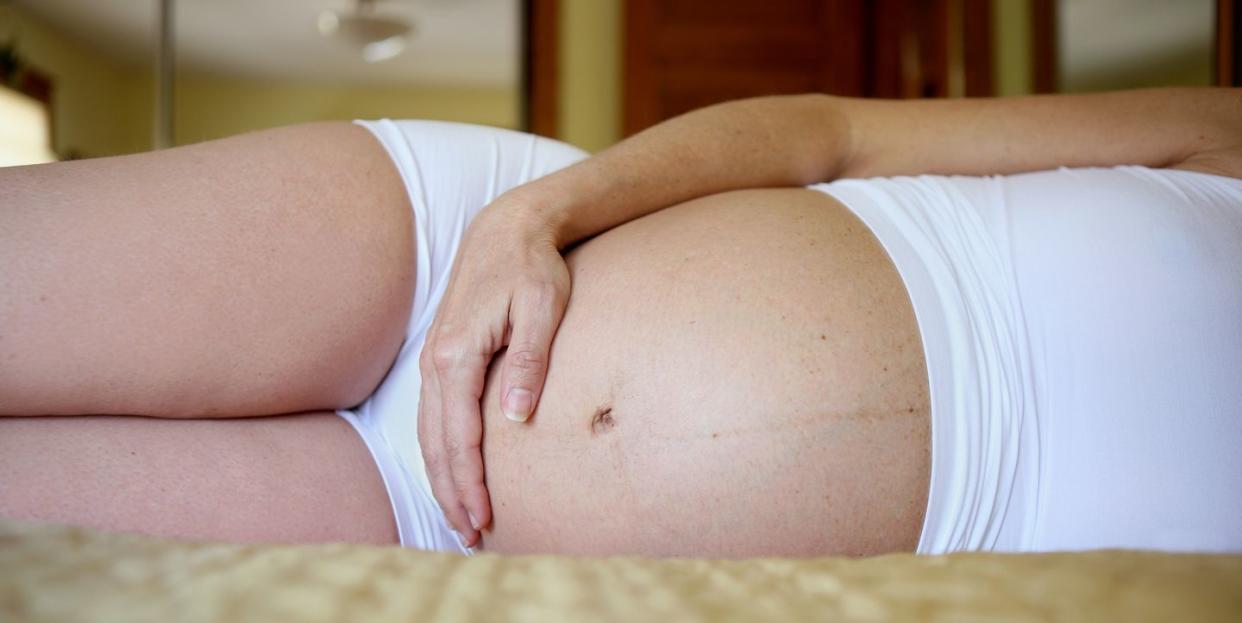
We will continue interviewing experts and updating this piece as more information becomes available.
As coronavirus (Covid-19) continues to spread across the UK, concerns remain as to how the infection affects the body longterm and the implications of those effects on more vulnerable people.
When it comes to pregnancy, the government has regularly stated that pregnant women are among the group of 'at risk' people who should take ‘particular care to minimise their social contact’ for 12 weeks. 'If you are in your third trimester (more than 28 weeks’ pregnant) you should be particularly attentive to social distancing,' the RCOG recommends.
That said, pregnant women do not appear to become more unwell than other healthy adults who contract the virus. The BBC reports that Christoph Lees, professor of obstetrics at Imperial College London, has stated: 'If there were huge risks, we would have seen them by now.'
Naturally, this has been a greatly concerning time for pregnant women.
Amy O’Brien-Wright, 30, is currently 37 weeks pregnant with her second child and is concerned about her birth plan: ‘The pace at which the virus is spreading leaves me less certain that current arrangements and practices in my maternity hospital will remain the same,’ she tells ELLE UK.
‘It feels like things will be open to change with potentially little or no warning which will certainly lead to me being more anxious about the birth and after care.’
In order to dispel some of the worry and to give as much practical advice as possible, we've interviewed a range of experts - from doctors and midwives, through to women considering the implications of their maternity - to give you the most up-to-date information for all stages of pregnancy and we will continue to update this guide as and when the situation develops.
The Government's Advice For Pregnant Women and Coronavirus
With lockdown measures continuing to change, it is still essential that those 'at risk' of the virus continue follow social distancing guidelines.
Government guidance states: 'It remains the case that some people are more clinically vulnerable to COVID-19 than others. These include those aged over 70, those with specific chronic pre-existing conditions and pregnant women.
'These clinically vulnerable people should continue to take particular care to minimise contact with others outside their households, but do not need to be shielded.'
On Monday March 16, the UK’s Chief Medical Adviser Chris Whitty spoke about the situation concerning pregnant women during the outbreak of the virus at a live press briefing.
‘We’re very early in what we know on this,’ Whitty told viewers. ‘The Royal College of Obstetrics and Gynaecology (RCOG), which is the professional body who reviewed the evidence – it’s on their website – and it makes clear that in the very small number of pregnant women who delivered at or shortly around the time they had [Covid-19], there were no complications.’
The news came hours after a newborn baby in north London, born to a woman with coronavirus, had tested positive for the virus too.
Whitty continued, noting that with all infectious diseases, ‘there is a small but appreciable, additional risk and we will not know that until a lot more women have had children’.
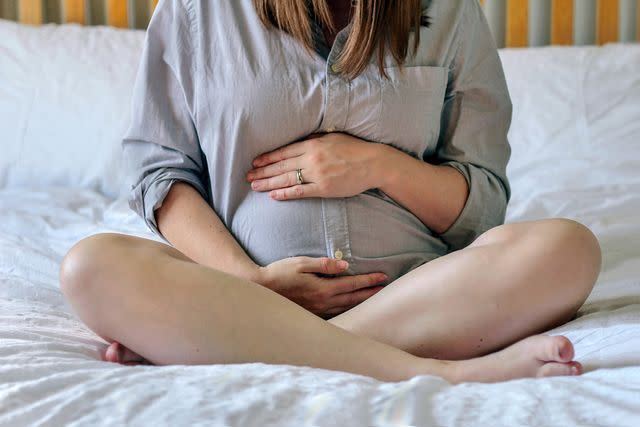
‘The information we have is relevant to people in the third trimester of pregnancy, but not in the earlier stages of pregnancy… There is no evidence from other cases of coronavirus that this is, particularly in the way that the Zika virus was, dangerous to pregnant women.'
Whitty said that women who are pregnant are included in the list of vulnerable, or ‘at risk’, groups of people as a 'precautionary measure'.
On Wednesday March 18, a baby tested positive for Covid-19 in Norfolk at the James Paget University Hospital in Gorleston and is being treated in isolation.
A hospital spokesperson said, via The Independent, that: ‘An extensive contact tracing exercise is now under way by Public Health England to trace anyone who might have had close (face-to-face) contact.
‘Close contacts will be given health advice about symptoms and what to do if they become unwell in the 14 days after they had contact with the confirmed case.’
In information updated on December 22, the RCOG reiterates that' studies from the UK show that pregnant women are no more likely to get seriously unwell from coronavirus but pregnant women have been included in the list of people at moderate risk (clinically vulnerable) as a precaution'.
What should pregnant women do during the pandemic?
The RCOG advises the following for pregnant women:
Follow the guidance on staying alert and safe (social distancing) and appropriate use of face coverings for the general public and clinically vulnerable people, including pregnant women (this guidance covers England only - if you live in Scotland, Wales or Northern Ireland, you should follow the specific advice in those parts of the UK)
Keep mobile and hydrated to reduce the risk of blood clots in pregnancy
Stay active with regular exercise, a healthy balanced diet, and folic acid and vitamin D supplementation to help support a healthy pregnancy
Attend all of your pregnancy scans and antenatal appointments unless you are advised not to
Contact your maternity team if you have concerns about the wellbeing of yourself or your unborn baby
More information is available on the NHS website.
Should pregnant women have a flu jab?
The Royal College of Obstetricians and Gynaecologists and Royal College of Midwives are urging all pregnant women to have a free flu jab as soon as possible during the ongoing pandemic.
On Monday October 12, the Royal College of Obstetricians and Gynaecologists tweeted: ‘We are urging all pregnant women to get their free flu vaccination this winter to protect themselves and their baby from complications caused by the flu virus.’
We are urging all pregnant women to get their free flu vaccination this winter to protect themselves and their baby from complications caused by the flu virus. To find out more speak to your pharmacist, GP or midwife. Read more: https://t.co/8E6hsad1Dv pic.twitter.com/SV6Iog08O6
— RoyalCollegeObsGyn (@RCObsGyn) October 12, 2020
A statement on the RCOG’s website reads: ‘Some of the symptoms of flu including fever, cough, shortness of breath and fatigue, are similar to those of COVID-19 and that is why during the COVID-19 pandemic, the RCOG and RCM strongly recommend that pregnant women take up the offer of free flu vaccination.
‘It is possible to get infected with flu and COVID-19 at the same time, and Public Health England’s research shows that if you get both at the same time you may be more seriously ill.’
Dr Edward Morris, President of the RCOG notes: ‘We are keen to reassure pregnant women that flu vaccination is safe for women to have at any stage in pregnancy - from the first few weeks right up to their due date, and while breastfeeding.
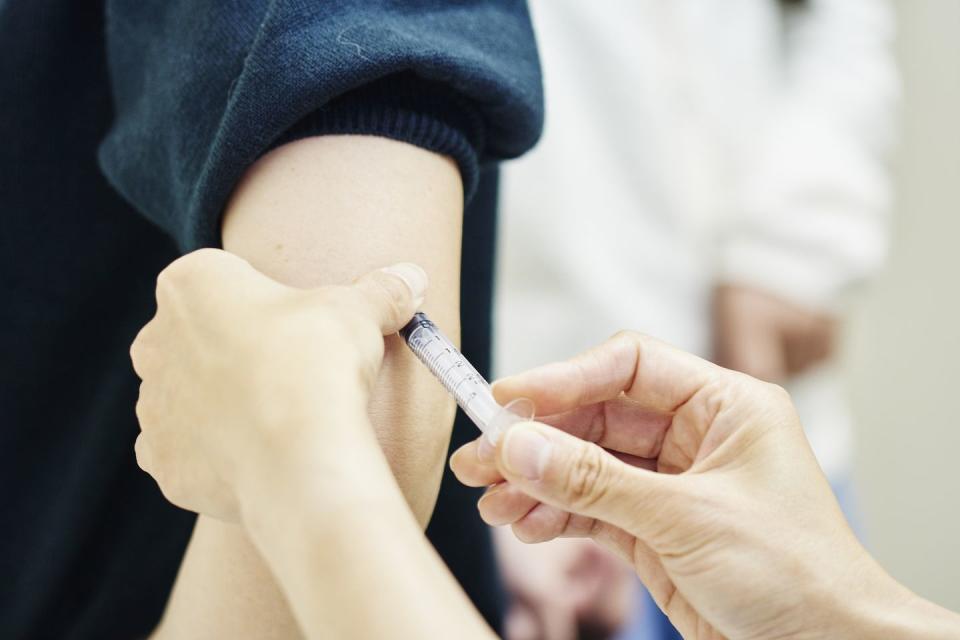
‘Over the last 10 years, the flu vaccine has been routinely and safely offered to pregnant women in the UK. The vaccine can also pass some protection to babies, which lasts for the first months of their lives.’
You can find out more information about the flu jab in pregnancy here.
What effect does Covid-19 have on pregnant women?
Given that Covid-19 is a new virus, the full and longterm implications of the resulting illness are still somewhat unknown.
However, the RCOG states that ‘pregnant women do not appear to be more severely unwell if they develop coronavirus than the general population’.
'It has long been known that, whilst pregnant women are not necessarily more susceptible to viral illness, changes to their immune system in pregnancy can be associated with more severe symptoms,' its guidance published on April 17 reads. 'This is particularly true towards the end of pregnancy. The absolute risks are, however, small.'
The organisation says that it expects that the large majority of pregnant women will experience ‘mild or moderate cold/flu like symptoms’ and that there is no evidence to suggest an increased risk of miscarriage.
The RCOG also states that emerging evidence suggests that ‘transmission from mother to baby during pregnancy or birth (vertical transmission) is probable.
‘There has been a report of a single case in which this appears likely, but reassuringly the baby was discharged from hospital and is well,’ a statement on the organisation’s website reads.
‘In all previously reported cases, infection was found at least 30 hours after birth. It is important to emphasise that in all reported cases of newborn babies developing coronavirus very soon after birth, the baby was well.
Current evidence suggests that it is ‘considered unlikely that if you have the virus it would cause problems with the baby’s development’.
It is important to remember, however, that pregnant women are more vulnerable to getting infections than women who are not pregnant and so should be ultra-observant of the preventative measures like hand and face washing.
‘If you have an underlying condition, such as asthma or diabetes, you may be more unwell if you have coronavirus,’ the RCOG adds.
On Friday 20 March, the UK Obstetric Surveillance System (UKOSS) launched a registry for all women admitted to UK hospitals with confirmed COVID-19 infection in pregnancy.
How can pregnant women protect themselves from getting Covid-19?
As per the NHS’ instructions, pregnant women should follow the same protocols as the general public to avoid infection.
The Centre for Disease Control and Prevention (CDC) states that actions to be taken to avoid the spread of the virus include:
Cover your cough (ideally into the crook of your elbow)
Avoid people who are sick
Clean your hands often using soap and water or alcohol-based hand sanitiser
And of course, wherever possible, heed the government's advice to stay inside with minimal contact.
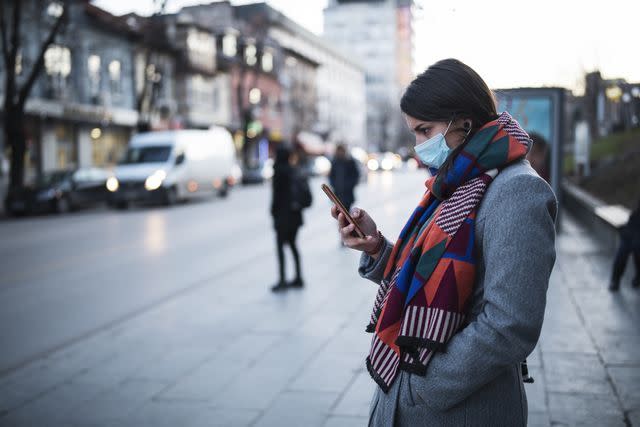
How would a pregnant woman be tested for Covid-19?
The RCOG states that only people with ‘severe symptoms who require overnight admission to hospital’ are currently being tested for the virus.
And the same guidelines apply to pregnant women. As per the government's instructions, an RCOG spokesperson tells us that if you start to experience mild symptoms such as a fever above 37.8 degrees and a dry cough, you should immediately self-isolate. You should not share a bed with a partner, use separate towels and cooking equipment and treat cautiously with paracetamol only.
However, if a pregnant woman starts to develop more grave symptoms such as difficulty breathing, she needs to contact the NHS on 111, to make arrangements for an assessment and testing. She will be tested at the hospital in the same manner as any other individual.
The test currently involves swabs being taken from your mouth and nose. A person might also be asked to cough up saliva and mucous.
Women are advised to attend via private transport where possible or call 111/999 for advice as appropriate, by the RCOG. If an ambulance is required, the call handler should be informed that the woman is currently in self-isolation for possible COVID-19.
The individual will be met at the maternity unit entrance by staff wearing appropriate personal protective equipment (PPE) and be provided with a surgical face mask.
What should you do if you are pregnant and test positive for Covid-19?
If you develop symptoms of coronavirus and test positive for it, the RCOG advises pregnant women to contact their midwife or antenatal team to inform them of the diagnosis as soon as possible and ask further advice.

'The main symptoms of coronavirus are a high temperature, a new, continuous cough or a loss or change to your normal sense of smell or taste (anosmia). Most people with coronavirus have at least 1 of these symptoms,' the RCOG outlines.
It also states that pregnant women have been advised to reduce social contact by the government based on the theoretical risks to pregnancy posed by COVID-19.
The organisation recommends that, where practical, appointments should be conducted on the telephone or using videoconferencing, provided there is a reasonable expectation that maternal observations or tests are not required.
Once a pregnant woman has recovered from the virus, an ultrasound scan will be arranged 14 days afterwards, to check on the health of both mother and baby. However, this time period might be reduced once more is learned about the virus, the RCOG explains.
If a pregnant woman has Covid-19 during pregnancy, will it hurt the baby?
Given the early stages of the pandemic, medical professionals are still unable to confirm for sure whether or not there is a risk that a developing baby will contract the virus from its mother (otherwise known as vertical transmission).
However, on Monday March 16, GP Rosemary Leonard stated on BBC Two's Victoria Derbyshire programme: 'So far there is no evidence coronavirus can harm an unborn baby.'
In the RCOG's updated information on December 22, it specifically outlines that 'current evidence from the UK suggests that pregnant women are at no greater risk of becoming seriously unwell than other healthy adults if they develop coronavirus.
'The majority of pregnant women experience only mild or moderate symptoms.'
Latest evidence on #covid19 infection in pregnancy is being regularly reviewed by the RCOG and @MidwivesRCM.
Read the updated guidance for women and health professionals: https://t.co/of8j3GhZD6 https://t.co/V0HHm8iDk8— RoyalCollegeObsGyn (@RCObsGyn) March 16, 2020
While there have been a small number of reported premature deliveries for babies born to mothers who tested positive for the virus during pregnancy, it’s not yet clear whether this was as a result of the infection or the result of a doctor’s decision to deliver early because of the mothers’ health.
Once born, a child will be tested for the virus if their mother has tested positive.
When questioned about the child that tested positive in London earlier this month, a spokesperson for The Royal College of Obstetricians and Gynaecologists told us: 'It is not known at what stage the baby was infected with the virus. Currently there are no confirmed reports of women diagnosed with coronavirus passing the virus to their babies while in the womb.'
Should pregnant women without virus symptoms cancel their antenatal appointments during the outbreak?
Gill Walton, CEO of the Royal College of Midwives, says that the organisation understands that this must be an 'unsettling time for pregnant women'.
That said, Walton wants to emphasise that 'attending antenatal and postnatal care when you are pregnant and have a new baby is essential to ensure the wellbeing of pregnant women and their babies.
'We would urge all pregnant women who are well to attend their care as normal.'
Sarah Murray, registered midwife and owner of Cambridge Midwives, agrees, noting that it is imperative for women who don't present symptoms of the virus to stick to their antenatal schedule as laid down by their midwife or antenatal team as much as possible.
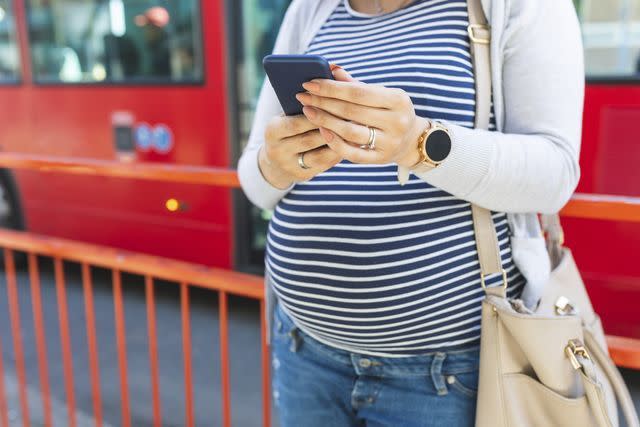
‘Don’t be tempted to delay anything, particularly appointments like first scans and blood results,’ she says. ‘While results will usually be fine, it’s at this point that certain health issues can be picked up early on in pregnancy.’
The RCOG adds that if a pregnant womanhas a routine scan or visit due in the coming days, they should contact their maternity unit for advice and to agree a plan.
'You may still need to attend for a visit but the appointment may change due to staffing requirements,' it says.
'If you are between appointments, please wait to hear from your maternity team.'
Should pregnant women with virus symptoms, or those who have tested positive, cancel their antenatal appointments ?
Firstly, Walton states that if 'you are pregnant and have symptoms of possible coronavirus infection, you should call to defer routine visits until after the [14 day] isolation period is over'.
The RCOG explains that it is likely that ‘routine antenatal appointments will be delayed until isolation ends’.
It adds: ‘If your midwife or doctor advises that your appointment cannot wait, the necessary arrangements will be made for you to be seen. For example, you may be asked to attend at a different time, or in a different clinic, to protect other patients.’
During self-isolation, pregnant women are also advised by the RCOG ‘not to attend maternity triage units or A&E unless in need of urgent pregnancy or medical care’. Where possible, stick to separate outpatient maternity units.
Of course, if you have any concerns about your health or that of your child during the self-isolation period, you are advised to contact your midwife, out-of-hours services, or your maternity team for more advice.
What if you've just found out that you are pregnant?
If you have yet to register your pregnancy with the GP or a hospital and you do not want to go to your GP surgery unnecessarily, you can find your local NHS maternity services in order to telephone them or you can seek an independent midwife in the UK. For further support, NCT.org.uk may also be able to offer advice through their helpline: 0300 330 0700.
Can you give birth as planned if you do not suspect Covid-19 at the time of delivery?
Katherine Hales, National Coordinator at the Association of Radical Midwives, says that pregnant woman shouldn't need to take any extra precautions when giving birth in a hospital. However, they should abide by the government’s advice on social distancing and the RCOG's suggestions on limiting social contact as much as possible when they go into the hospital.
As for the possibility of staff shortages on maternity wards or in birth centres, the midwife says that pregnant women 'shouldn’t be too concerned'.
She explains: ‘Some midwives are registered nurses so [hospitals] wouldn’t be wanting them working with pregnant women, and working in high risk areas of the infection and switch between the two. They’ll be trying to keep as many midwives doing midwifery as it’s difficult enough to provide midwifery care in the first place.'
A spokesperson from the RCOG adds that all labour wards in the UK have facilities for women to give birth in private rooms, 'and this will continue during the epidemic, with each woman cared for appropriately regardless of if she does or does not have confirmed or suspected coronavirus infection'.
While some Trusts and Boards had to pause their home birth service or close their midwife-led units during stages of lockdown in some areas of the UK, most of these have since been reinstated.
As for women who don't present any of the virus' symptoms and want homebirths, Hales says there is 'nothing wrong' with them proceeding as planned.
Murray agrees, adding that while homebirths are fine 'in principal', as is common practice during pregnancy anyway, women should ‘make contingency plans in advance with their midwife to prepare for a birth at home, a birth in a midwifery centre or in a delivery unit’ and 'ensure they have a birth pack from the community team'.
The RCOG warns: 'If you have chosen to give birth at home or in a midwife-led unit that is not co-located with an obstetric unit, it is worth noting that these services rely on the availability of ambulance services to allow for rapid transfer to hospital, and the right number of staff to keep you safe.
'If these are not in place, it is possible that your Trust or Board may not be able to provide these services.'
If a midwife feels that they are extra susceptible to the virus or have underlying health issues, this might play a factor as to whether they will attend a homebirth, regardless of whether a pregnant woman has the virus or not.
Murray also warns that those wanting a homebirth who live in an urban, populated area with increasing pressure on staff, might find that the community team (homebirths require two midwives) 'may not come out as midwives could be required at nearby hospitals'. As a result, it is imperative pregnant women discuss birth options as far in advance as possible.
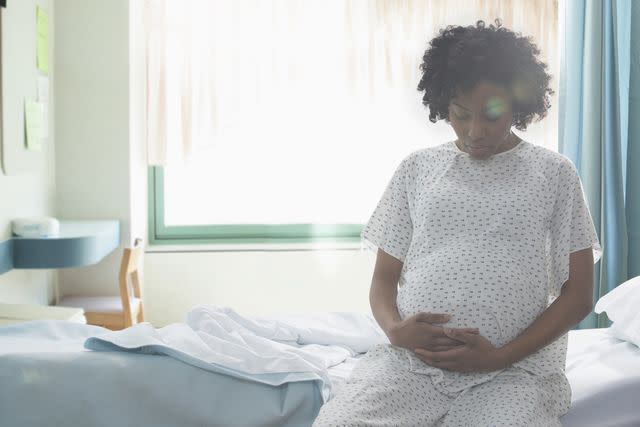
Siobhan Miller, founder of The Positive Birth Company, tells us that her colleagues are currently seeing a rise in the number of women considering a homebirth which they presume to be as a result of Covid-19.
‘Women are telling us they are keen to avoid going to hospital for fear of contracting the virus,’ she says, noting that in 2017 there were over 13,500 homebirths (approximately two per cent of all births) and that they’re 'expecting to see a significant increase in this number this year as a result of the virus'.
‘We believe it might be the catalyst in changing the way we give birth in the future by making more women aware of their options,' Miller adds.
If you are suspected or confirmed to have Covid-19, will this affect how you give birth?
At the moment, there is no evidence to suggest you cannot give birth as planned, either vaginally or via caesarean, if you have confirmed or suspected Covid-19, the RCOG states. The same can be said for those wanting an epidural or a spinal block.
However, there are certain precautions that you need to be made aware of.
If you do have suspected or confirmed Covid-19, the RCOG states that the use of gas and air may increase aerosolisation and spread of the virus, so medical professionals might discuss various other options of pain relief instead.
Pregnant women experiencing breathing problems might be recommended to have a more immediate birth with a caesarean.
The use of birthing pools in hospital are also to be avoided in suspected or confirmed cases, given the inability to use adequate protection equipment for healthcare staff during water birth and the risk of infection via faeces.
The RCOG is also advising, as a 'precautionary approach', for pregnant women with suspected or confirmed coronavirus that when they go into labour, they attend an obstetric unit for birth.
This is so that 'the baby can be monitored using continuous electronic foetal monitoring, and your oxygen levels can be monitored hourly', the organisation explains. As a result, this would rule out the possibility homebirths.
If you have recovered from Covid-19 and tested negative for it before you go into labour, where and how you give birth will not be affected by your previous illness, the RCOG notes.
Will a woman in labour be able to have a partner with her during the birth?
Many women have expressed concerns in recent weeks as to whether they will be able to have a birth partner present during the labour and birth.
The RCOG states that women are encouraged to have a birth partner present during labour and birth. However, if they have symptoms of Covid-19, ‘they will not be allowed to go into the maternity suite, to safeguard the health of the woman and the maternity staff supporting you’.
Local Trusts may also place restrictions on visitors, meaning some might not be able to attend routine antenatal appointments or stay with women on antenatal or postnatal wards.
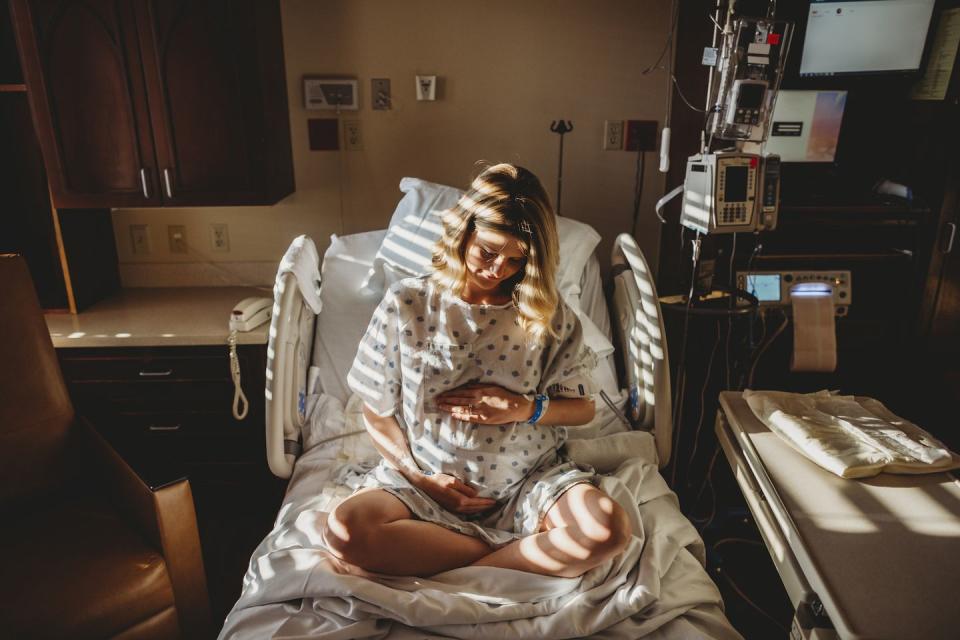
If a woman is to be induced, a birth partner without symptoms should be able to attend your induction of labour where that is in a single room, the organization says, but not if the induction takes place on a main ward.
‘We understand this must be a very worrying and anxious time if you are pregnant and your partner can’t be with you while you are being induced, however it is essential that we limit the number of visitors to hospitals during this time,’ it explains.
If an instrumental birth or caesarean is required, staff in the operating theatre will be waring personal protective equipment (PPE) to prevent the spread of infection.
‘While the maternity team will do all they can to ensure that your partner is present for the birth, there will be some occasions when there is a need for an urgent emergency birth with epidural or spinal anaesthetic, and it is not possible for your partner to be present,’ it adds.
‘This is because during an emergency operating theatres are more high risk environments in terms of potential spread of coronavirus to everyone who is present.
‘If it is the case that your partner will not be able to be present during the birth, your maternity team will explain this to you and will do everything they can to ensure that your partner can see you and your baby as soon as possible after the birth.’
You can read more information about advice for birth partners here.
Would a pregnant mother with Covid-19 be able to breastfeed?
The RCOG states that ‘person-to-person spread is thought to occur mainly via respiratory droplets produced when an infected person coughs or sneezes, similar to how influenza (flu) and other respiratory pathogens spread’.
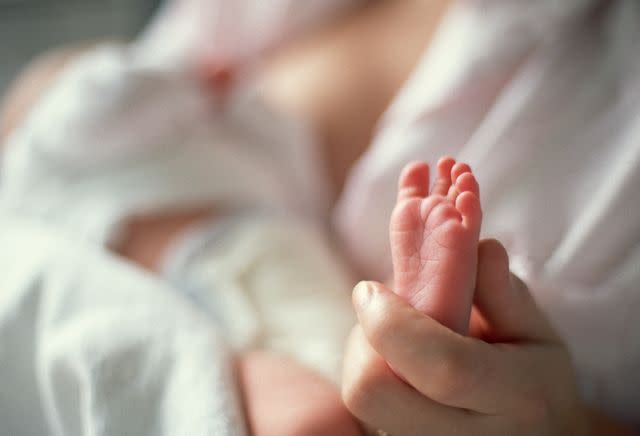
It continues, explaining that the virus has not been detected in breast milk, ‘however we do not know whether mothers with COVID-19 can transmit the virus via breast milk’.
The CDC advises mothers with flu to continue breastfeeding or feeding expressed breast milk to her child ‘while taking precautions to avoid spreading the virus to her infant’.
'A woman and her partner can be kept together with the baby following birth, as long as the baby is well and does not require care in a neonatal unit,' a spokesperson from the RCOG explains'.
‘Breast milk is full of antibodies,’ explains Murray. ‘By breastfeeding your child, you’re also doing the best for yourself in terms of your state of mind – keeping your adrenaline levels down, oxytocin levels up – unless you’re told otherwise.'
Given the uncertainties surrounding the virus at this stage, the RCOG recommends that women:
Wash their hands before touching the infant and wear a face mask, if possible, while feeding at the breast
Try to avoid coughing or sneezing on your baby while breast feeding
Wash their hands before touching any manual or electric breast pump or bottle parts
Consider having someone who is well feed the expressed breast milk to the infant.
When it comes to skin-to-skin contact, it is up to the mother whether she wants to do so with her child.
The RCOG says: ‘There are some reports from China which suggest women with confirmed coronavirus have been advised to separate from their baby for 14 days. However, this may have potential negative effects on feeding and bonding.’
Professor Russell Viner, President of the Royal College of Paediatrics and Child Health, adds: 'We don't want to see the mother and baby separated, even when the mother tests positive for coronavirus. Similarly, our advice is that it's fine to breastfeed – any potential risks are outweighed by the benefits. We will continue to review the evidence as it emerges.'

Those with questions about skin-to-skin contact should discuss the risks and benefits between medical professionals.
Would a pregnant woman with no Covid-19 symptoms be able to attend antenatal classes?
Hales says that it is unknown how antenatal classes will run during the outbreak but she believes most face-to-face ones will be cancelled.

‘My advice is for pregnant women to check up with whoever is providing their care, whether it’s individual midwives or those running classes, to see if they’re doing online versions,' she says.
On virtual classes, Murray suggests pregnant women to speak to their NCT group or hypnobirthing class in advance and enquire about the possibility of virtual attendance, whether or not they have the virus.
Miller concurs, adding that she expects to see 'see less people attending group ante-natal classes, and a surge in demand for online learning and digital classes that can be completed from the safety of one’s home'.
Would a pregnant woman with suspected or confirmed Covid-19 be able to attend antenatal classes?
A spokesperson from the RCOG explains that, similar to antenatal appointments, for women who have symptoms that may indicate they are infected with coronavirus, 'they should follow public health guidance on self-isolating and let their midwife or maternity clinic know'.
Should you stockpile certain baby products?
UK retailers have said that they are working ‘closely’ with the government and suppliers to ensure an increase in deliveries to stores so that shelves are well-stocked.
While stockpiling isn’t advisable, it’s important to be sensible, says Murray.
'Nappy production and delivery won’t be cut off, for example. However, if you want to lower your anxiety, you can always buy a few extra pots of Sudocrem and nappies, so that you’re not running in and out of the shops if you are concerned about contracting the virus or are in self-isolation. You can also do some homework on Amazon and plan what you might need.'
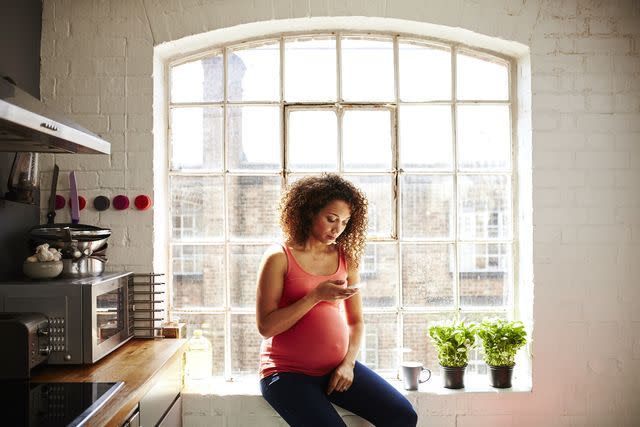
O’Brien-Wright says she has noticed her fellow shoppers stockpiling nappies and baby medication, such as Calpol and Nurofen, with many other baby medications in short supply in her local supermarkets.
She explains: ‘As a result, I’ve purchased similar medications sooner than I would have as I’m thinking ahead to my baby’s first set of vaccinations. I've had to visit several shops to buy these and recently managed to find the last single bottle of Calpol on the shelf.
‘People are stockpiling baby formula which is a concern. I plan to breastfeed but if this doesn’t work out for some reason then I may struggle to find supplies easily which would be stressful.’
As ever, the government's advice is to try to refrain from stockpiling, as you may be removing access to vital products from other mothers if you do.
Should you take Vitamin D supplementation?
Vitamin D supplementation is recommended to all women during pregnancy, according to the RCOG.
While there have been reports that those with low levels of vitamin D are at an increased risk of serious respiratory issues if they develop Covid-19, there is currently no sufficient information that suggests that taking it prevents infection or is an effective treatment.
You can get Vitamin D supplements via most pharmacies, supermarkets and the NHS Healthy Start scheme but the RCOG suggests pregnant women speak to their midwife or maternity team regarding questions about vitamin D supplementation.
How can you manage your anxiety as a pregnant woman during the Covid-19 outbreak?
It is understandable that Covid-19 may cause stress for many people.
The CDC advises people to take regular breaks from reading about the pandemic on the news and on social media, eat healthy well-balanced meals, get plenty of sleep, take time to do activities they enjoy and connect with others.
Murray advises pregnant women to take at least a 30-minute walk every day (‘It’s good for foetal positioning, vitamin D and getting endorphins and you can do it early in the morning before people are on the streets), downloading yoga apps, practicing breathing and running a nice, long bath with candles.
‘Limit your news, practice ‘clean sleep’ (which means staying away from screens) from 5pm, talk to people who are supportive and regularly place your hands on your tummy and talk to your baby,’ she adds.
‘As is best practice postnatally, ask loved ones not to visit until you feel ready and if you have an older child, make sure you wash your hands before and after using the toilet and keep any scars, such as those following a C-section, clean to avoid any complications that might require medical attention.’
Will you be able to travel while pregnant during the pandemic?
Those wanting to travel from the UK should follow the advice given by the Foreign and Commonwealth Office.
Everyone, including pregnant women, should ensure they have adequate insurance arrangements prior to travel. 'You should also check that your travel insurance will provide cover for birth and care of your newborn baby if you give birth while abroad,' warns the RCOG.
Find out more information about the guidelines and research into pregnancy and coronavirus here. Visit the World Health Organisation website and the NHS website to find out the latest information regarding the coronavirus.
Like this article? Sign up to our newsletter to get more articles like this delivered straight to your inbox.
You Might Also Like


